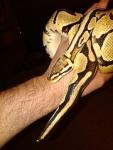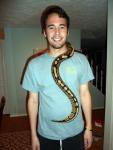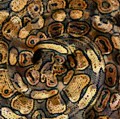» Site Navigation

2 members and 2,175 guests
Most users ever online was 47,180, 07-16-2025 at 05:30 PM.
» Today's Birthdays

» Stats

Members: 75,934
Threads: 249,129
Posts: 2,572,284
Top Poster: JLC (31,651)
|
-
Re: I am going to have to disagree
 Originally Posted by ssballow

I would say that depending on the conotation, the words are synonymous, at least as I used it. Any vertebrate can be conditioned to adapt to routine. One of the simplest instincts in animals is the aquisition of food. If the aquisition is the same over a certain time period, the animal will come to depend on the same thing happenning and adapt to the same behavior. Some of those behaviors can eventually be written into genetic code becoming permenant adaptations. At least this is how I understand it.
Semantics, wonderful.
Most of the time.
Thanks though. Didn't help, but didn't hurt either.
I may not be very smart, but what if I am?
Stinky says, "Women should be obscene but not heard." Stinky is one smart man.
www.humanewatch.org
-
-
BPnet Veteran


Re: I am going to have to disagree
I am totally and utterly lost, these big words hurt my brain. 
-
-
Re: I am going to have to disagree
 Originally Posted by ssballow

I disagree. Flatworms such as as planaria can be trained with electrical shock. They are far lower on a developemental scale than a reptile.
 Originally Posted by wilomn

Is training doing something you have decided to do as opposed to conditioning which is something you do in a given set of circumstances, ie, electro-shock stimulation?
Or is there no difference at all?
 Originally Posted by ssballow

I would say that depending on the conotation, the words are synonymous, at least as I used it. Any vertebrate can be conditioned to adapt to routine. One of the simplest instincts in animals is the aquisition of food. If the aquisition is the same over a certain time period, the animal will come to depend on the same thing happenning and adapt to the same behavior. Some of those behaviors can eventually be written into genetic code becoming permenant adaptations. At least this is how I understand it.
Translation:
Yup, maybe.
I hope that helps.
I may not be very smart, but what if I am?
Stinky says, "Women should be obscene but not heard." Stinky is one smart man.
www.humanewatch.org
-
The Following User Says Thank You to wilomn For This Useful Post:
-
BPnet Veteran


Re: I am going to have to disagree
 Originally Posted by wilomn

Translation:
Yup, maybe.
I hope that helps.
It all makes sense now. haha. and to think I couldnt understand that. 
-
-
BPnet Veteran


Re: I am going to have to disagree
All of my snakes are fed in thier enclosures, and I've had very few agression issues. Infact, alot of my sankes have become a bit more docile. Granted they are on f/t but I don't make it easy for them (dead rat dance, so they actually have to hunt some).
I would make sure he doesn't equate hand with food by handling him and what not, and I would not drop the mouse in with my hand, but with something else to that he doesn't see the heat from your hand and think "DINNER!"
When I feed live (sometimes I have to for the picky ones) I keep them in a box and gently drop them in without pre-scenting and let the snake do all the hunting. No prolonged agression issues at all.
2.1 Pastels - ED, George, Ailia.
1.0 '08 Poss. Het Albino - Norm
0.1 Proven Normal - Ragani
On the way IE when I have the money:
0.1 Albino
0.1 Spider
0.1 Mojo
-
-
BPnet Veteran


Re: I am going to have to disagree
 Originally Posted by wilomn

This makes about as much sense to me as this: if you blow up a balloon it will expand but if you don't it could but may not....
Really? I thought it was pretty clear. But I'll try to explain it further...
If you give an odor puff to a bee then give it sucrose it will extract its proboscis (the thing they use to eat). If you give it the same odor puff again without presenting the sucrose it will still extend its proboscis expecting to be fed again. Here classical conditioning has occurred after only one pairing of the unconditioned stimulus (the sucrose) with the conditioned stimulus (the odor puff). The animal has paired the odor puff with the food so that the odor puff alone is enough to produce the feeding response.
A forum member doubted that the snake could "learn aggression" after only one feeding in the tank. Knowing this about bees then I'd say yes, this is absolutely plausible. But do I know this for certain? Of course not...
And as for the intelligence thing...I'm pretty sure most animals have the capacity for some levels of associative learning (i.e. classical conditioning) so I definitely wouldn't count snakes out on this. Leeches, crayfish, praying mantises, bees, etc. have been classically trained so why not snakes?
Dennis
-
-
Re: I am going to have to disagree
 Originally Posted by Hapa_Haole

Really? I thought it was pretty clear. But I'll try to explain it further...
If you give an odor puff to a bee then give it sucrose it will extract its proboscis (the thing they use to eat). If you give it the same odor puff again without presenting the sucrose it will still extend its proboscis expecting to be fed again. Here classical conditioning has occurred after only one pairing of the unconditioned stimulus (the sucrose) with the conditioned stimulus (the odor puff). The animal has paired the odor puff with the food so that the odor puff alone is enough to produce the feeding response.
A forum member doubted that the snake could "learn aggression" after only one feeding in the tank. Knowing this about bees then I'd say yes, this is absolutely plausible. But do I know this for certain? Of course not...
And as for the intelligence thing...I'm pretty sure most animals have the capacity for some levels of associative learning (i.e. classical conditioning) so I definitely wouldn't count snakes out on this. Leeches, crayfish, praying mantises, bees, etc. have been classically trained so why not snakes?
Dennis
Absolutely none.
What is an odor puff?
I think semantics is at the root of this discussion and not any real disagreement with possibilities.
For me anyway.
I may not be very smart, but what if I am?
Stinky says, "Women should be obscene but not heard." Stinky is one smart man.
www.humanewatch.org
-
-
Registered User


Re: I am going to have to disagree
I'm sorry guys. I tend to use vocabulary like that so I myself won't forget what it means. I went through a lot to get my degree, but hardly ever use my knowledge for anything important. Please, excuse my ramblings!
Yes, any animal, complex enough to have a spinal chord, is capable of learned behavior/training/conditioning/routine.
-
-
BPnet Veteran


Re: I am going to have to disagree
 Originally Posted by wilomn

Absolutely none.
What is an odor puff?
I think semantics is at the root of this discussion and not any real disagreement with possibilities.
For me anyway.
Absolutely none of what?
An odor puff is a little puff of air they shoot at the bee that has a distinct smell. I'm not sure how they go about doing it but I imagine a really weak vacuum hose that shoots air instead of sucks it.
Dennis
-
-
Re: I am going to have to disagree
 Originally Posted by Hapa_Haole

Absolutely none of what?
An odor puff is a little puff of air they shoot at the bee that has a distinct smell. I'm not sure how they go about doing it but I imagine a really weak vacuum hose that shoots air instead of sucks it.
Dennis
Hmmmm, I thought I was agreeing with a question I can no longer find.
The brain dims with usage as I have just proven.
Do bees do the protruding proboscis everytime they land on something or only when it smells tasty?
I was picturing a coloured ball like the crunch berries in Captian Crunch cereal when you mentioned puffs. They're sweet too. And quite colourful.
I may not be very smart, but what if I am?
Stinky says, "Women should be obscene but not heard." Stinky is one smart man.
www.humanewatch.org
-
 Posting Permissions
Posting Permissions
- You may not post new threads
- You may not post replies
- You may not post attachments
- You may not edit your posts
-
Forum Rules
|